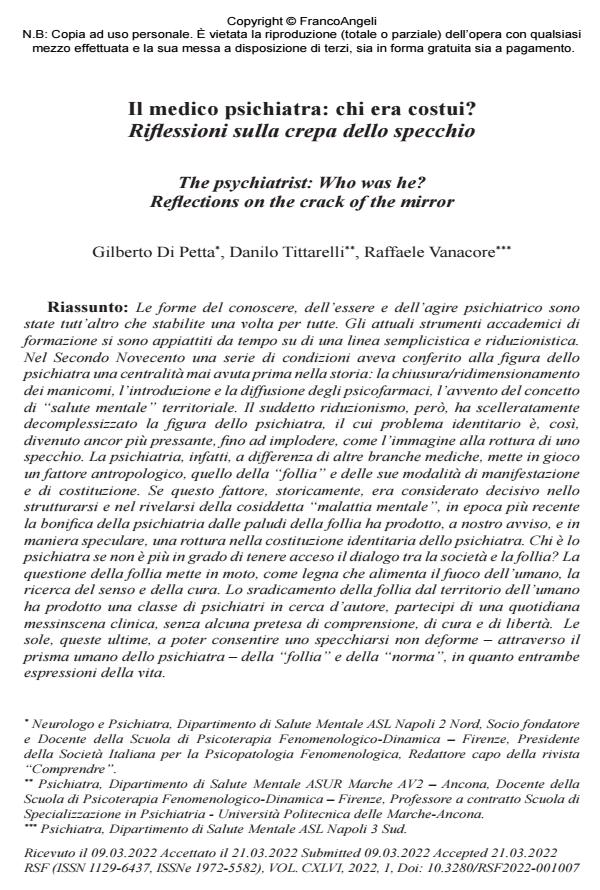The psychiatrist: Who was he? Reflections on the crack of the mirror
Journal title RIVISTA SPERIMENTALE DI FRENIATRIA
Author/s Gilberto Di Petta, Danilo Tittarelli, Raffaele Vanacore
Publishing Year 2022 Issue 2022/1
Language Italian Pages 21 P. 113-133 File size 259 KB
DOI 10.3280/RSF2022-001007
DOI is like a bar code for intellectual property: to have more infomation
click here
Below, you can see the article first page
If you want to buy this article in PDF format, you can do it, following the instructions to buy download credits

FrancoAngeli is member of Publishers International Linking Association, Inc (PILA), a not-for-profit association which run the CrossRef service enabling links to and from online scholarly content.
The forms of psychiatric knowledge and practice are far from being established once and for all. The current academic instruments of education have long flattened on a simplistic and reductionist line. In the second half of the Twentieth Century, a series of conditions had given the figure of the psychiatrist a centrality never had before in history: the closure/reorganization of asylums, the introduction and spread of psychopharmaceuticals, the advent of the concept of "community mental health". The aforementioned reductionism, however, has recklessly decomplexised the figure of the psychiatrist, whose identity problem has, in this way, become even more pressing, to the point of imploding, like the image at the breaking of a mirror. Psychiatry, in fact, unlike other medical branches, puts into play an anthropological factor, that of "madness" and its modalities of constitution and manifestation in the world. If this factor, historically, was considered decisive in the structuring and revealing of the so-called "mental illness", in more recent times the drainage of psychiatry from the swamps of madness has produced, in our opinion, a crack in the psychiatrist’s identity. Who is the psychiatrist if he is no longer able to keep the dialogue between society and madness alive? The question of madness sets in motion, like wood that feeds the fire of the human, the search for meaning and care. The eradication of madness from the territory of the human has produced a class of psychiatrists "in search of author" [1], participants of a daily clinical staging, without any claim to understanding, care and freedom. The anthropological factor, indeed, is the only one that can allow a not deformed mirror - through the human prism of the psychiatrist - of "madness" and "norm", as both expressions of life.
Keywords: Psychiatry, mirroring, identity, education, encounter, madness.
Gilberto Di Petta, Danilo Tittarelli, Raffaele Vanacore, Il medico psichiatra: chi era costui? Riflessioni sulla crepa dello specchio in "RIVISTA SPERIMENTALE DI FRENIATRIA" 1/2022, pp 113-133, DOI: 10.3280/RSF2022-001007